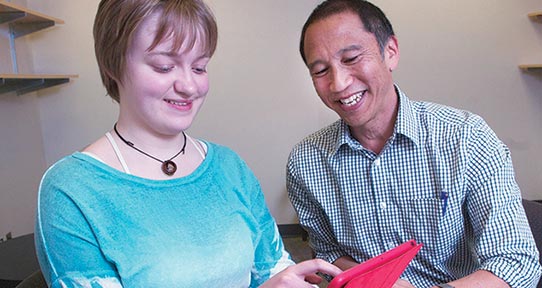Face value

UVic researchers give children with autism a fun way to hone their social skills
by Kim Westad
It looks and sounds like any computer game, quickly pulling youngsters into its world. Within seconds of starting FaceMaze, a seven-year-old boy is smiling school-photo style at the screen, then making the grouchiest face he can.
A few moments later, he's playing Let's Face It. It doesn't take him long to recognize photos on the screen of his teacher, the girl next door—both of whom he had a difficult time recognizing earlier.
The games are about a lot more than having fun. They're a key part of research taking place at the University of Victoria’s Centre for Autism Research Technology and Education (CARTE).
The centre opened in 2011 and pulls together resources from the university and the community. It develops innovative technologies to help the increasing number of people with autism spectrum disorder (ASD).
Projects at the centre range from workshops for early childhood teachers to the creation of groundbreaking computer games using the latest advances in software and hardware technologies.
While the research is complex, the motto is straightforward—new tools for different minds. Says Jim Tanaka, a UVic psychologist and CARTE director: "Autism is not a disability. It's simply a difference."
Autism presents with an extremely wide range of severity and associated features, so is commonly referred to as a "spectrum" disorder, to capture the variety.
One of the early markers of a person being on the spectrum is lack of eye contact with others. "Eye contact is how we connect," says Tanaka. "Individuals with autism are like the rest of us 'neurotypicals.' If we don't want to interact with someone, a sensible strategy is to avoid making eye contact with them."
But that, along with sometimes exhibiting few facial expressions of their own, can make social and emotional communication more difficult for people on the spectrum. Often, they have difficulty with social skills and understanding the emotions of others. Difficulty recognizing people and reading their emotions compounds that social unease.
CARTE researchers reasoned that these skills could be taught to young people with ASD—so what better way than computer games? They teamed up with the Temporal Dynamics of Learning Center in San Diego to develop software that analyzes facial expressions in real time in a variety of games and iPad apps.
In FaceMaze, the player navigates through a path with a PacMan-like character, chasing after pink candy. To get a prize, the player gets past obstacles by mimicking facial expressions, which the face recognition system checks. If it meets the criteria for "happy" or "sad," for example, the obstacle is removed and the player scores.
CARTE works closely with several local schools and much of the research and programming is done by UVic students. The hands-on experience gives students a chance to put their education to use while still learning, says Tanaka. "UVic students are an integral part of our research program, and are making a real difference in the community."
Some of the games will be available as iPad apps in the fall. Visit the CARTE website for more information.
View as PDF (267K).
Autism Spectrum Disorder (ASD) is a group of developmental disorders typically apparent before age three that can cause various levels of social, communication and behavioural challenges.
The learning, thinking and problem-solving abilities of people with ASD can range from gifted to severely challenged. Some people with ASD need a lot of help in their daily lives; others need much less.
In general, ASDs occur in about one in 200 people in Canada. They occur in all racial, ethnic and socio-economic groups but are four times more common among boys than girls.
What causes ASD is not known. Current research is focusing on genetics, pre- and post-natal brain development, environmental factors, viral infections, and immune responses and deficiencies.
Symptoms can be diminished and life skills learned through therapies and support services. Early diagnosis and intervention are important in helping people with ASD achieve their full potential. Info: Autism Society Canada
